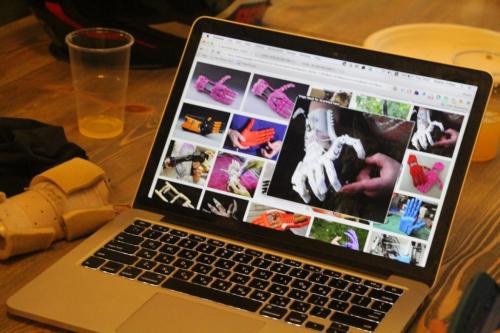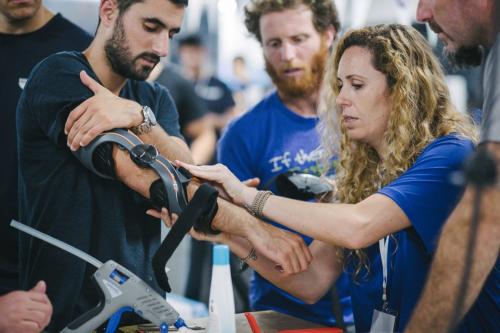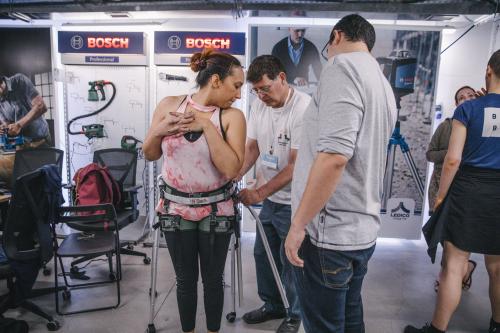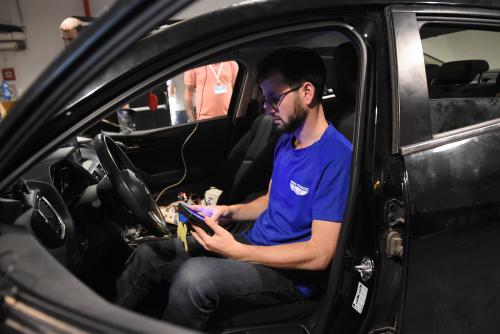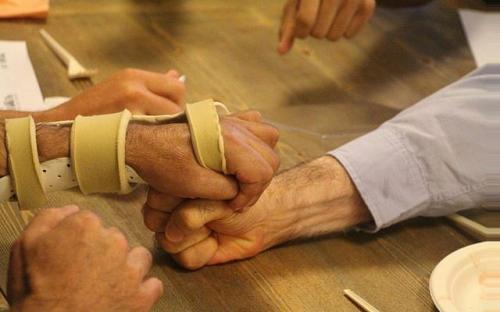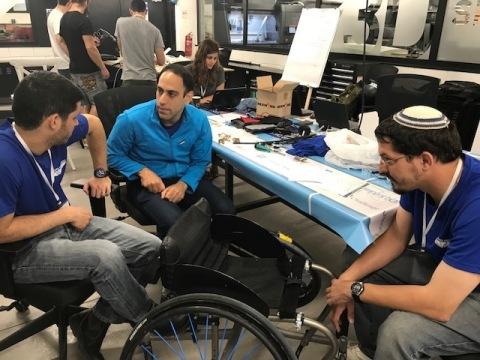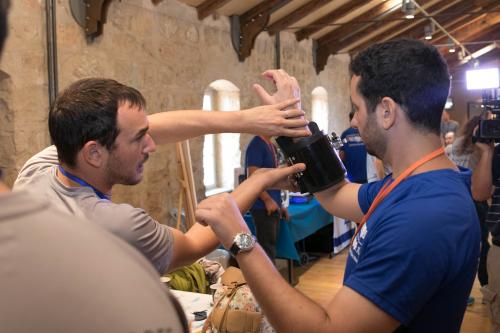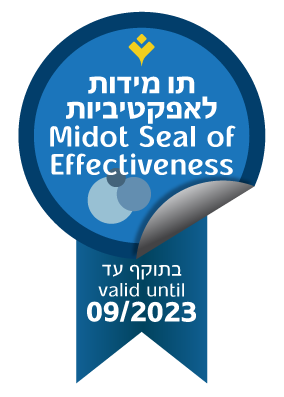By NoCamels May 03 2018
Dancing the night away, getting on a surfboard, and sitting leisurely eating ice cream can be simple, enjoyable everyday activities for some people, though possibly not in that order. For those with physical impairments, they can be difficult, or sometimes impossible.
This week, Israeli tech innovators gathered in Tel Aviv for a special project that would allow wounded veterans from Israel, the United States, and France to reclaim parts of what used to be their daily lives – executing salsa moves, catching waves, or simply sitting in a chair.
Some 200 professionals – product designers, psychologists, developers, engineers, programmers, and doctors – participated in a three-day hackathon, or make-a-thon, to create physical solutions that would address the everyday challenges faced by 12 selected veterans as a result of injuries sustained in service.
The initiative, dubbed “Makers for Heroes,” is the first event of its kind and was organized by RESTART, an Israeli non-profit organization that helps injured soldiers regain a sense of normalcy, and Tikkun Olam Makers (TOM), a global initiative by Israeli think tank the Reut Group that connects people with disabilities and the elderly with “makers” to develop unique solutions for their difficulties. TOM regularly hosts make-a-thons across the world to work on products that solve specific issues, including in the US, Argentina, Australia, Bulgaria, Khazakstan and, of course, in Israel.
Makers for Heroes at Impact Labs. Courtesy
“Makers for Heroes” was held at the Reut Group’s Impact Labs, TOM’s R&D Center, set up last year in partnership with co-working giant WeWork, as a space for entrepreneurs, companies, and social innovators to develop physical products with the support of state-of-the-art hardware and design tools, including IoT and electronic labs, laser cutters, high-end 3D printing, metalwork, photography and 3D scanning, and robotics. It was inaugurated in 2017 as the first-of-its-kind 1,000 sq. meter hardware innovation center at WeWork Hazerem in Tel Aviv.
Over the 72-hour event, 12 teams created prototypes for the 12 veterans that were specific to their needs and in accordance with their challenges. The teams sat together with the veterans a month ago to begin working on a design and ending with the make-a-thon.
Reut Group Founder Gidi Grinstein tells NoCamels that the goal is to “create and deliver solutions that are affordable and that are not on the market nor are they provided by governments.”
He says that the make-a-thon was a “traditional TOM event,” powered by an Israeli-developed, game-changing venture, in synergy with RESTART and Impact Labs, which he called a “national and global center for innovation for people in need” as well as a “hub for innovation in hardware.”
A design for a 3D-printed hand-like product. Photo by Manela Andlao
“Makers for Heroes” is a flagship RESTART initiative, which this year brought in Challenge America, an organization that assists wounded veterans from the US, as a partner. The non-profit, founded by entrepreneurs and business executives from the Israeli high-tech world, runs mentorship programs for injured veterans to help with the journey toward their new normal lives.
“For each person it’s different, the goals [for the mentorship] can be professional, like trying to find work, or continuing their education,” says Nevo Alva, the head of the program and the co-founder and CEO of Visualead, an Israeli QR startup recently acquired by Chinese e-commerce giant Alibaba.
Alva says that since RESTART already works with Israeli veterans all-year long, the organization turned to them directly for the “Makers for Heroes” event.
“Whether it’s surfing, playing the piano, exercising, or skiing, it is very meaningful for them to regain the ability to do these things,” he says.
The products made for the veterans “are just amazing,” he says. A customized surfboard, for example, was made for Inbal, 34, an Israeli soldier serving in the 33rd Caracal Battalion when she was shot in the back, paralyzing her and ending her surfing days.
Such a surfboard, he says, “is something I imagine a lot of people would want, it has so much potential.”
Makers for Heroes create a customized surfboard for Inbal, a soldier injured while serving in the IDF. Courtesy
Or an affordable and portable device that allows another paralyzed former soldier to “just stand up for a little while.” Known solutions on the market are so expensive, this is life-changing, he adds.
For Zarita Patrice Croney, a 33-year-old US veteran from Kentucky who served in Afghanistan, it was dancing. Croney had been dancing from the age of three and after her deployment, she was physically injured in two car accidents. With bulging discs and a diagnosis of fibromyalgia syndrome (FMS), a long-term condition that causes intense pain, Croney says she was in a “very low place and even considered suicide.”
“I was on pain management and taking muscle relaxants for six years,” she tells NoCamels. “The side effects were muscle spasms and tremors and I stopped dancing because I just couldn’t trust my own body.”
“Makers for Heroes” made her a sort of contraption with a harness that would support her weight in case of a fall, and let her move uninhibited while dancing.
“I am so lucky to have been chosen for the program through Challenge America,” she says, adding that it gave her hope and will surely do the same for others.
Assaf Dory, an Israeli-American ex-IDF soldier whose leg was amputated after a shootout in Florida where he was working as the deputy sheriff, tells NoCamels that he heard of RESTART through another Israeli organization. Dory said he was intrigued and contacted friends at Challenge America who said they “must get involved.”
“This is such an amazing event, I’m still trying to get used to it,” he says.
Dory and his Daughter
Dory recent had his 41st operation since his injury and has nerve damage in the remaining part of his limb. Sitting on hard surfaces, like chairs, is a very painful and uncomfortable experience for him.
“I couldn’t really go and do things with my family because I would need to bring my wheelchair every time,” he explains. “Now I’m sitting in this product made for me and for the first time in years, I am not in pain.”
Dory’s team made him a soft shell customized to his shape made of carbon-fiber with a removable memory-foam that protects his remaining limb from nerve irritation and allows him to sit comfortably on any surface.
“I can now go sit and have ice cream with my daughter,” he says.
Grinstein tells NoCamels that the veterans, and all those who participate in TOM make-a-thons, go home with the prototypes while forgoing the intellectual property of the design and product.
“Everything is deposited into the public domain, no one owns it. So even though we made a product suitable for a specific person and it is customized to their shape, body measurements etc, the idea is universal,” and belongs to everyone essentially, he explains.
Grinstein estimates that, so far, TOM has been involved in the development of over 350 prototypes.
“This is a project that seeks to help humanity, and one of our big ideas is to have these products be freely available to people and thrive in areas that don’t have market solutions.”
TOM is a philanthropic, not-for-profit organization sponsored largely by the Charles and Lynn Schusterman Family Foundation, he emphasizes, and it does not charge anyone for the products. “This is our logic for creating a radical solution to a social problem,” he says.
And the satisfaction and sense of purpose for everyone involved is immense, he says.
The professionals who build the products “all want to do something [beyong the scope of their work], they want to give back. Some are even retired and want to continue contributing.
Alva tells NoCamels that certainly, mentors and employees at RESTART get back as much as they give, if not more.
“I’ve mentored dozens of startups [helping to navigate them in the Israeli tech ecosystem] but I’ve never felt as I do now, doing this mentorship with veterans,” he says.
https://nocamels.com/2018/05/innovators-injured-veterans-makers/

